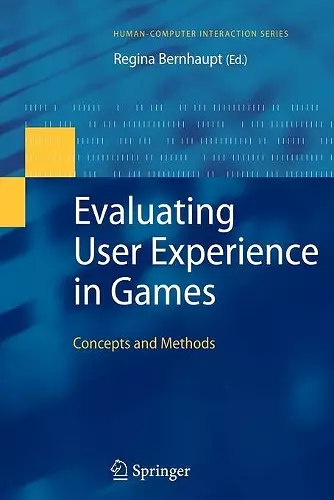Evaluating User Experience in Games
Concepts and Methods
Format:Paperback
Publisher:Springer London Ltd
Published:1st Jul '12
Should be back in stock very soon

This book provides a thorough exploration of user experience evaluation in games, highlighting innovative methods and their importance for game development.
In Evaluating User Experience in Games, the author provides a comprehensive introduction to the evolving field of user experience evaluation specifically within the gaming industry. This volume highlights the growing importance of understanding player interactions and satisfaction, showcasing a variety of theories, methods, and scales developed to assess games effectively. As the complexity and cost of game development rise, so does the need for sophisticated evaluation techniques that can cater to the diverse audience of gamers today.
The book emphasizes the significance of user experience in games, illustrating how effective evaluation can lead to better design and product development. It discusses innovative tools and techniques that have emerged, allowing for more nuanced assessments of player experience. This collection of work marks a pivotal moment in game evaluation, as it offers fresh insights and critical perspectives that can be beneficial not only to game developers but also to the broader field of Human-Computer Interaction (HCI).
Each chapter delves into specific aspects of user experience evaluation, starting with an overview in Chapter 1 that presents a general framework for current methods. By summarizing the methodologies discussed throughout the book, readers can quickly identify the most suitable approaches for evaluating their own game projects. The conclusion draws attention to recurring themes and challenges, encouraging an ongoing dialogue about the future of user experience evaluation in the gaming landscape.
From the reviews:
“The book promises to address the evaluation of user experience, it provides little in terms of actual analysis and more in terms of anecdotes of data collection efforts for various specific games. … provides a broad overview of the practice of gathering user experience data for computer-based games. … The current volume is appropriate for a course that introduces the concepts of collecting user feedback in a traditional HCI and game development setting.” (Thom McLean, ACM Computing Reviews, December, 2ISBN: 9781447125570
Dimensions: unknown
Weight: unknown
277 pages
2010 ed.